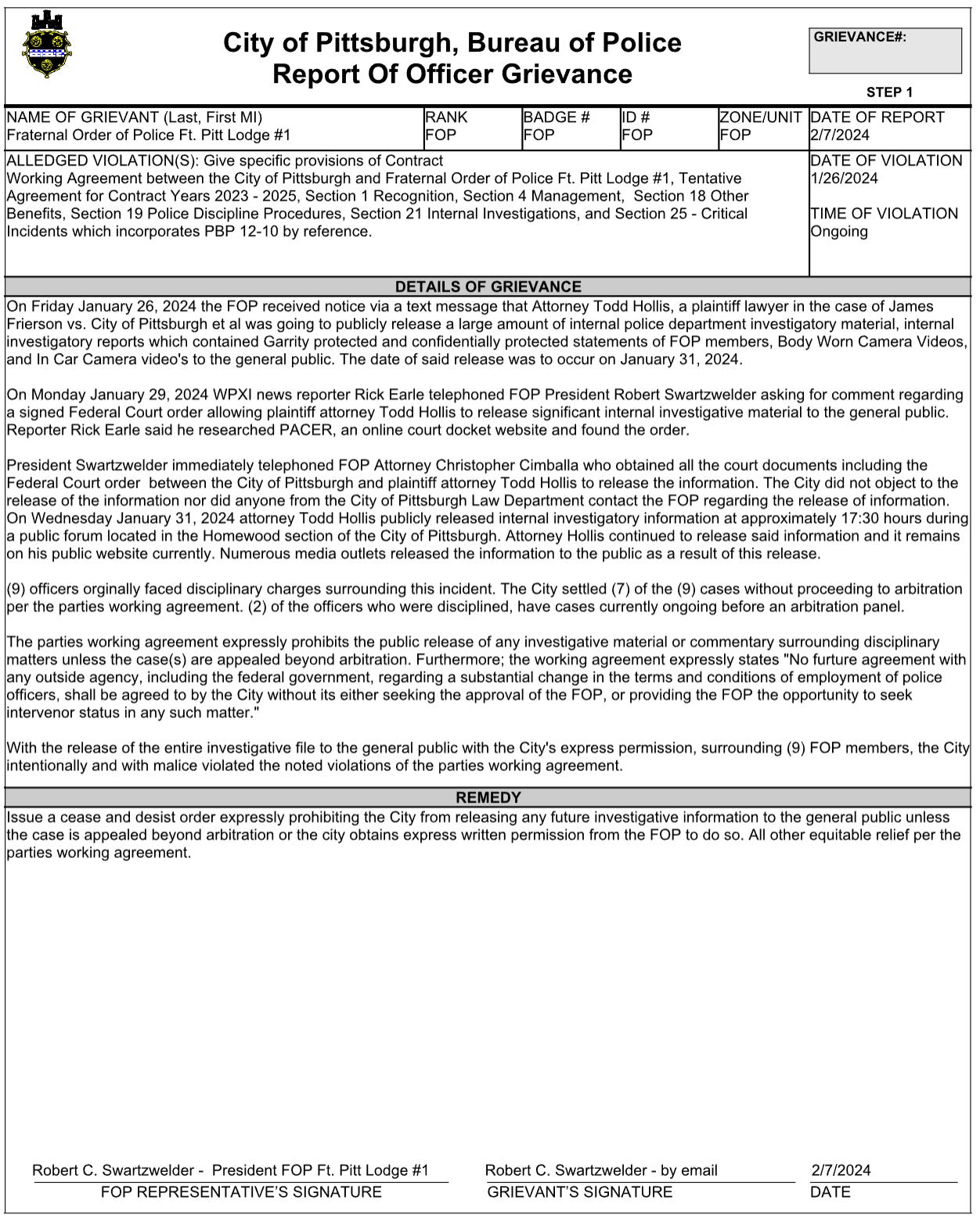Pittsburgh Police Union Files Grievance Over City's Settlement Terms in Jim Rogers Case
Once learning about its release, Swartzwelder thought the City should block the release of the footage. But based on the agreement, they were never going to.
By Bobby Harr
Details and terms of the $8 million settlement agreement paid by the City of Pittsburgh to the family of Jim Rogers have been hard to find until now.
Eyes on PGH has obtained a copy of the signed, handwritten agreement that attorney Todd Hollis used in a motion to enforce payment of the settlement agreement and obtain court-ordered permission to release bodycam footage and other evidence to the public.
In the agreement, the City arranged to pay the $8 million to the Rogers family over time and, among other things, agreed not to object to any request made by the plaintiff to release the bodycam footage from the police incident that led up to Jim Rogers's death. The City, attorneys for the Rogers family, and attorneys for eight involved police officers signed it on April 26, 2023.

Union president Bob Swartzwelder has now filed a grievance with the City on behalf of the Fraternal Order of Police, Fort Pitt Lodge No. 1, in response.
Before the agreement, the City refused to provide the police union with copies of evidence in the Jim Rogers case until forced by court order. According to documents, the City took over a year to release the requested information to the union.
Regarding the public release of the evidence, Swartzwelder says the City's law department should have contacted them and demanded they only release further investigative material with the permission of the FOP. He says they violated the terms of their working agreement, which led him to file a grievance and potentially an unfair labor practice.
"With the release of the entire investigative file to the general public with the City's express permission, surrounding (9) FOP members, the City intentionally and with malice violated the noted violations of the parties working agreement." he wrote.
Attorney Todd Hollis, who represents the family of Jim Rogers, released the bodycam footage through his website on January 28 and held a public viewing of it the following Wednesday after a court order approved it. Hollis additionally has released the report from use-of-force expert David Wright and says he plans to release more evidence.
Once learning about its release, Swartzwelder thought the City should block the release of the footage. But based on the agreement, they were never going to.

"The city shall not object to any request by the plaintiff, whether made to the district attorney, chief of Pittsburgh Police or to the court of common pleas, for the release of video at issue," says the summary term sheet.
Dismissal of the involved officers as defendants, no admission of liability, and mutual non-disparagement are additional terms. The City also agreed to meet and confer with the plaintiff regarding practice and policy issues within 30 days following council approval and execution of a settlement agreement and release.
Hollis said he wanted to see policy changes rather than just money, but it is unclear if that ever happened. After Mayor Ed Gainey's office released a statement citing policy changes within the police department since the death of Jim Rogers, Hollis said those policies already existed.
"The policies were already in place. The police officers didn't follow them," he said.
Of the settlement money, $3.9 million went to Jim Rogers's daughter, Lanesha Kennedy, $2.7 million, including expenses, went to attorney Todd Hollis, and $1.3 million went to the estate of Jim Rogers. Hollis said at a press conference that it was about the money for the Rogers family, but he never wanted to settle the case.
Attorney Todd Hollis did not respond to a request for comment on this story.
Bob Swartzwelder issued the following statement:
“The City controlled the litigation from the outset and controlled the agreement language between the plaintiff and the City. The City abdicated its contractual confidentiality requirements between the police officers and the City regarding this incident. No public statements or releases of information may occur unless the City obtains the permission of the FOP or notifies the FOP so that the FOP may intervene on its members behalf. From the signed agreement documents FOP representation is absent. Instead, the City surreptitiously made an agreement which is expressly contractually prohibited. The FOP is proceeding through the contractual grievance process and a potential Unfair Labor Practice surrounding the blatant violation of officer labor rights. However, the FOP's labor actions will not release the City from any individual civil or libel suits the officers may pursue as private litigants.”
PLAIN TEXT / SUMMARY TERM SHEET
JAMES FRIERSON v CITY OF PITTSBURGH
SUMMARY TERM SHEET
The parties to the above action have agreed to settle it. In summary form, the material terms of this agreement are as follows:
1) Payment to the plaintiff of eight million dollars ($8,000,000) payable over three years. $2,000,000 within 30 days of council approval and execution of a settlement agreement and release; $3,000,000 twelve months thereafter; $3,000,000 twelve months thereafter.
2) Full, general, and final release;
3) Defendant city agrees to meet and confer with plaintiff in respect to practice and policy issues within 30 days following council approval and execution of a settlement agreement and release;
4). Mutual non disparagement;
5). Individual defendants to be dismissed and the settling defendant to be the city;
6). The city shall not object to any request by plaintiff, whether made to the district attorney, chief of Pittsburgh Police or to the court of common pleas, for the release of video at issue;
7) No admission of liability.
Bobby Harr is the founder of Eyes on PGH, a citizen journalism project based in Pittsburgh, PA. Send story tips to bobbyharrpgh@gmail.com.



